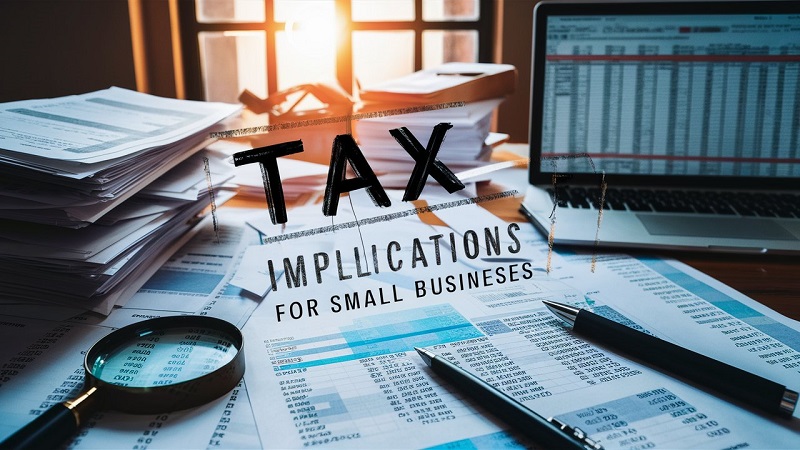
PNL in Business: The One Chart You Need to See to Make Money Flow
April 25, 2024
Empowering Your Small Business: The Value of Consistent Accounting
May 6, 2024Part 1: Tax Implications of Investing for Small Businesses
I. Introduction
Small businesses looking to grow their wealth often consider investing their earnings. These investments can take many forms, from stocks and bonds to real estate or venture capital funds. However, understanding the tax implications of investing is crucial before diving in. This article will explore the different types of investments commonly pursued by small businesses, how capital gains and losses are taxed, and the potential tax benefits available. We’ll also delve into how the chosen business structure can impact the tax treatment of investments.
II. Types of Small Business Investments
There’s a variety of investment options available to small businesses, each with its own risk-reward profile and tax considerations. Here’s a breakdown of the three main categories:
-
A. Equity Investments
- Stocks in publicly traded companies: Owning shares in publicly traded companies allows businesses to participate in the stock market’s growth potential. These investments can generate capital gains when sold for a profit or losses if sold at a price lower than the purchase price.
- Ownership stake in private companies: Investing in private companies can offer higher growth potential but also comes with greater risk due to the lack of liquidity compared to publicly traded stocks. Tax implications for ownership stakes depend on the specific structure of the company and the type of investment made.
-
B. Debt Investments
- Loans to other businesses: Small businesses can invest by providing loans to other businesses. These debt investments generate income in the form of interest payments. If the loan defaults, a bad debt deduction may be available on the borrower’s tax return, depending on the specific circumstances.
-
C. Alternative Investments
- Real estate investment trusts (REITs): REITs allow businesses to invest in real estate indirectly. Tax implications for REITs can vary depending on the specific type of REIT and how it distributes income.
- Venture capital funds: Investing in venture capital funds can offer high growth potential but also carries significant risk. The tax treatment of venture capital investments can be complex.
III. Taxing Capital Gains and Losses from Investments
Understanding how capital gains and losses are taxed is essential for any small business owner considering investments.
-
A. Capital Gains Tax Rates
- The tax rate applied to capital gains depends on how long the investment was held before it’s sold.
- Short-term capital gains: Gains from investments held for less than one year are taxed at the same rate as ordinary income from the business. This can be a significant tax burden for some businesses.
- Long-term capital gains: Gains from investments held for more than one year typically benefit from a lower capital gains tax rate compared to ordinary income tax rates.
- The tax rate applied to capital gains depends on how long the investment was held before it’s sold.
-
B. Calculating Capital Gains and Losses
- To determine if a capital gain or loss has occurred, you need to calculate the difference between the investment’s basis (purchase price plus any fees or commissions) and the selling price.
- Gain: If the selling price is greater than the basis, a capital gain is realized.
- Loss: If the selling price is lower than the basis, a capital loss is incurred.
- To determine if a capital gain or loss has occurred, you need to calculate the difference between the investment’s basis (purchase price plus any fees or commissions) and the selling price.
-
C. Strategies to Minimize Capital Gains Taxes
- There are strategies that small businesses can employ to minimize their capital gains tax burden:
- Holding investments for the long-term: This allows them to potentially benefit from the lower long-term capital gains tax rate.
- Tax-loss harvesting: Selling investments at a loss to offset capital gains from other investments and potentially reduce taxable income.
- There are strategies that small businesses can employ to minimize their capital gains tax burden:
IV. Tax Benefits for Small Business Investments
The good news is that there are also potential tax benefits associated with small business investments.
-
A. Section 1202 Qualified Small Business Stock (QSBS)
- Section 1202 of the tax code offers a significant tax incentive for investments in qualified small business stock (QSBS). Under certain conditions, a portion or even all of the capital gains from the sale of QSBS can be excluded from taxation.
- However, there are strict eligibility requirements for QSBS, such as the type of business and the holding period for the stock.
-
B. Other Potential Tax Benefits
- Some business-related expenses associated with investments, such as investment management fees, may be deductible on the business tax return.
V. Tax Considerations for Different Business Structures
The way a small business is structured can significantly impact how investment income is taxed. Here’s a brief overview of the tax treatment for different structures:
-
A. Sole Proprietorships
- In a sole proprietorship, there’s no separate business entity from the owner. All business income, including investment income, is reported on the owner’s personal tax return.
-
B. C Corporations
- C corporations are taxed as separate entities from their owners. Investment income earned by a C corporation is subject to the corporate income tax rate, which can be lower than the highest marginal income tax rate for individuals. However, there can be double taxation issues when profits are distributed to shareholders as dividends.
-
C. S Corporations
- S corporations offer pass-through taxation, similar to sole proprietorships. The corporation’s investment income “passes through” to the shareholders’ personal tax returns, where it’s taxed at individual income tax rates.
-
D. Limited Liability Companies (LLCs)
- LLCs offer flexibility in choosing their tax treatment. They can elect to be taxed as a pass-through entity like an S corporation or as a C corporation. The chosen tax structure will determine how investment income is taxed for the LLC and its members.
Part 2: Additional Considerations and Resources
VI. Recordkeeping for Investment Activities
For any small business owner venturing into investments, meticulous recordkeeping is crucial. Accurate records are essential for tax purposes and to track the performance of your investments. Here’s what you should keep track of:
- Purchase and sale details: Date of purchase and sale for each investment.
- Basis: The original purchase price of the investment, including any fees or commissions.
- Selling price: The amount received when selling the investment.
- Income generated: Interest income from debt investments, dividends from stocks, or any other income derived from the investments.
- Expenses incurred: Management fees, transaction costs, or any other expenses related to the investments.
Utilizing tax software or consulting with a qualified accountant can simplify recordkeeping and ensure you’re capturing all the necessary information for accurate tax reporting.

VII. Impact of State and Local Taxes on Investments
It’s important to remember that federal taxes aren’t the only consideration. Some states impose capital gains taxes or other investment-related taxes. Researching state and local tax implications on your investments is essential to get a complete picture of your potential tax burden.
VIII. When to Consult a Tax Professional
While this article provides a general overview, navigating the tax complexities of small business investments can be challenging. Here are some situations where consulting a tax professional is highly recommended:
- Complex investment scenarios: If you’re considering investing in complex financial instruments or alternative assets, seeking professional guidance can help you understand the tax implications and potential risks.
- Uncertainty about tax implications: If you’re unsure about how a specific investment will be taxed or how it interacts with your overall business tax situation, a tax professional can provide clarity and ensure you’re compliant.
- Choosing the right business structure for investments: The tax treatment of investments can vary depending on your business structure. A tax professional can advise you on the most tax-efficient structure for your specific circumstances and investment goals.

IX. FAQs
Here are some frequently asked questions (FAQs) regarding taxes and small business investments:
- Q: Can I deduct business losses from investments on my tax return?
A: In some cases, losses from business-related investments may be deductible on your tax return. However, the deductibility depends on the type of investment and the overall circumstances. Consulting a tax professional can give you specific guidance on your situation.
- Q: How does depreciation of investment property affect taxes?
A: If you invest in real estate or other depreciable assets, you may be able to claim depreciation deductions on your tax return. These deductions spread the cost of the asset over its useful life, reducing your taxable income.
- Q: Are there tax implications for receiving dividends from stocks?
A: Dividends received from stocks are generally considered taxable income for your business. The specific tax rate applied depends on whether the corporation is a domestic or foreign corporation and your overall tax situation.
- Q: What are the tax consequences of investing in a retirement account for my business?
A: Contributions to qualified retirement plans, such as SEP IRAs or solo 401(k)s, may be tax-deductible for small businesses. However, there are complex rules regarding distributions from these accounts, and consulting a tax professional is recommended.
- Q: How can I track the tax basis of my investments?
A: Maintaining detailed records is crucial for tracking the tax basis of your investments. This includes keeping receipts, purchase confirmations, and any other documentation related to your investments. Many online brokerage platforms also provide tools to track your investment basis.
X. Conclusion
Investing can be a powerful tool for small businesses to grow their wealth and achieve their financial goals. However, understanding the tax implications of different investments is essential for making informed decisions. This article has provided a foundational understanding of the tax considerations involved in small business investments. Remember, consulting a tax professional for personalized advice is crucial, especially for complex situations. By carefully considering the tax implications and seeking professional guidance when needed, small businesses can navigate the world of investments with greater confidence and maximize their returns.
Resources
Internal Revenue Service (IRS): Publication 550, Investment Income and Expenses
- This is a resource directly from the IRS (.gov website) providing a comprehensive guide to investment income and expenses for taxpayers. It covers topics like capital gains and losses, recordkeeping for investments, and various tax deductions related to investments. This is a valuable resource for small businesses to get a complete understanding of the tax implications of their investments from the official government source.
Small Business Administration (SBA): Business Startup Guide
- This SBA (.gov website) resource provides a general guide for starting a small business. While it doesn’t delve deep into investment taxes, it does cover the different business structures (sole proprietorship, LLC, C Corp, etc.) and how they impact taxes. This can be a helpful starting point for small businesses unfamiliar with these structures and their tax implications, which can also affect investment income taxation.
Forbes: 5 Tax-Advantaged Investment Options for Small Businesses
- This Forbes article discusses various investment options that can offer tax advantages for small businesses. While it’s not a tax advice resource, it provides insights into specific investments like Section 1202 QSBS or retirement plans for small businesses, which can be explored further with a tax professional.
DISCLAIMER:The information in this article is for informational purposes only and is not meant to take the place of legal and accounting advice.




